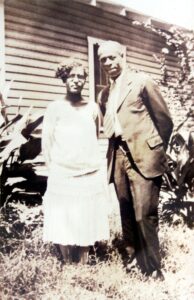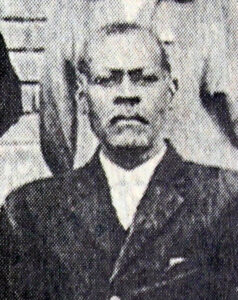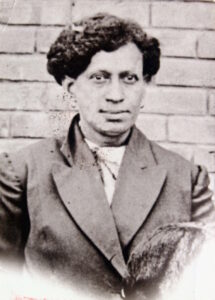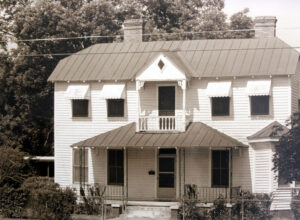Submitted by Edwina Clarkson; written by Ruth Gillis; edited and vetted by Cheri Todd Molter & Kobe M. Brown
Copies of photographs courtesy of Edwina Clarkson and taken by Dorien Caldwell
Edward and Sallie Evans are remembered in Fayetteville, N.C. as educators, church leaders, and civil rights advocates. Edward was born in 1863 to Isaiah and Phoebe Evans in Cumberland County. He attended rural schools, completing his education at the State Colored Normal School (“Normal School”). [The Normal School became Fayetteville State Teachers’ College in 1939. It was renamed Fayetteville State University in 1969.] Sallie Evans was born in 1866 and was the daughter of Benjamin Elliott and Millie Norris Elliott of Cumberland County.
Edward and Sallie met while attending the Normal School and they graduated in 1884 and 1885, respectively. They married on June 25, 1891, at Evans Chapel (later Evans Metropolitan AME Zion Church) with Bishop James Walker Hood officiating. Edward and Sallie had three sons: Edward Jr. (1892-1917), Hector McMillan (1897-1974), & Roy Alvin (1900-1983). Sallie was a classroom teacher for a number of years, both before and after she and Edward married. She later became vice-principal of the Normal School.
Edward’s first teaching experiences were at Fremont and Godwin, NC, in 1883. He taught at the Fayetteville Elementary School (1884-1896) and at the Normal School, for a time serving as vice principal (1896-1903). He was principal of the Fayetteville Graded School from 1903 to 1938. In 1903, he earned an A.M. degree from Livingstone College at Salisbury NC. Furthermore, Edward and Sallie’s home, a two-story Victorian house, was across the street from the Orange Street School. The Orange Street School was built by a locally prominent Black contractor named James Waddell in 1915. Edward was its first principal. The school served elementary students on the first floor and high school students on the second. Edward’s teaching career spanned 55 years.
Edward and Sallie were active leaders at the Evans Metropolitan AME Zion Church. After becoming a member of the church in 1880, Edward was elected Secretary of the Board of Trustees and then served as Member and Chairman of the Board for 48 years. He also served as a Sunday school teacher and superintendent of the school for 47 years. Sallie was a Sunday school teacher for 60 years and was president of the Missionary Society for 50 years. Both were active in the building of the current 1890s Evans Metropolitan AME Zion Church structure that replaced the 1850s building.
The Evanses were also prominent in civil organizations and active workers in the moral and civic welfare of the city. Masonic Lodges provided a foundation and network for support, communication, and fellowship for Black leaders in their communities and the state. Eureka Lodge #3, the third-oldest African-American Masonic Lodge in NC, was organized shortly after the Civil War. Edward served as the Worshipful Master of the lodge from 1897 to 1901, 1908-1910, 1916-1922, and 1937 to 1938. He also served as Grand Deputy of the Masonic Lodges 20th District of NC.
Sallie served as Grand Matron of Order of the Eastern Star (a Masonic appendant body) for 24 years. She contributed much to the organization’s growth and development. Sallie wrote a booklet in 1927 about the history, rules, and regulations of the Order of the Eastern Star for the State Grand Lodge.
In 1922, Southside Elementary School was built on Campbell Ave., between Old Wilmington Rd. and Gillespie St., for the education of Black children. When Edward retired in 1938, the Fayetteville School Board voted to honor his long and distinguished service to local schools by changing the name of the school to the Edward Evans School. Horace Sisk, who was then Fayetteville Schools Superintendent, acknowledged Edward’s “faithful service in which [he] endeavored to raise the standards of living and of morals of [his] people.”
Edward Evans died on April 17, 1943. At his funeral service at Evans Metropolitan AME Zion Church, on April 19, 1943, the hundreds of people who gathered to remember him heard President J. W. Seabrook of Fayetteville State Teachers’ College call Edward the last of the old great educators of Fayetteville; a man who was known by his stability of character and the permanence of his makeup. Reverend D. C. Pope’s eulogy referred to Edward as a firm and daring churchman, and an educator of the old school who was well read and an asset to his home, church, school, and community.
Sallie Elliott Evans died September 27, 1943, shortly after her husband. In his eulogy, Rev. D. C. Pope declared that her life was a beautiful one, characterized by love for humankind and a devotion to her home, church, lodge, and community.




